September 12, 2009
Jay-Z Gives Ten Reasons Why Pop Culture Authenticity Is Real Only If It's Fake On Purpose
"But that title doesn't even make sense!" Exactly. Yet here you are.
I watched Jay-Z's video Death of Autotune, in which he disparages guys like T-Pain for using autotune (electronic modulation of voice) and generally for being pop "z100" music, and not authentic "hot 97" black rap music.
Ok, calling someone less authentic than you is a standard combat maneuver. Nothing new there.
So if Jay-Z wants to depict his authenticity, to show how and raw, honest, legitimate he is in comparison to the other "niggas" he would do this by placing himself in authentic, legitimate, true to his roots situations and settings.
Here's where it got interesting.
Based on the video, Jay-Z is, deep down, a guy who dines alone in Italian restaurants.
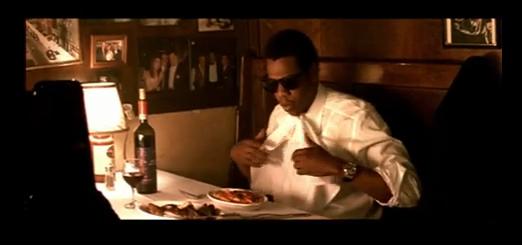
who pays his respects to the chef-- or the other way around--
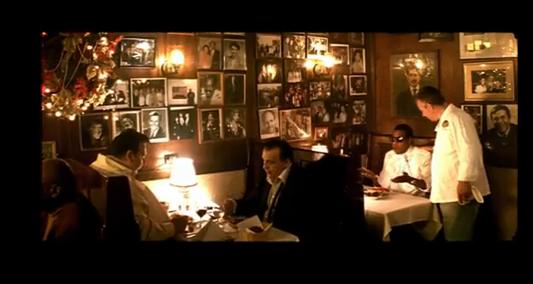
etc, for more pics see any episode of The Sopranos.
My first reaction was that maybe Jay-Z had had a stroke. Is he aware that he is not actually Italian?
After this meal, he goes to the back of the restaurant with other legitimate Italians like Harvey Keitel and, believe it or not:
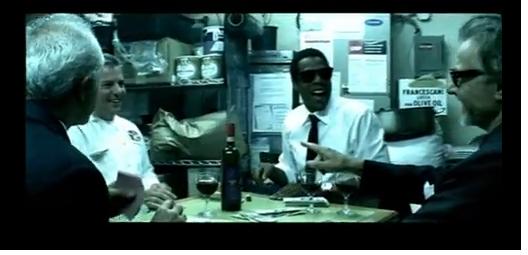
Yes this is an all night poker game, yes it is played in the stockroom of the restaurant, yes they are sharing a bottle of wine and some pasta, yes that's an olive oil sign, yes those are hundred dollar bills ("this ain't a strip club"), yes they are all in suits, and no he's not kidding.
In a video about getting back to basics and authenticity, he chooses an entire persona that couldn't be less authentic. What's crazy about this is that music today tries to be more urban, more street, more black-- things that he authentically is already, he's technically won his argument just by waking up in the morning-- and yet he instead picks a character that is utterly unrealistic, waves it in our face and and says, "this is me, keeping it real."
II.
It would be easy to just say he's an idiot, but this is a man who is hypersuccessful precisely because he can manipulate imagery to connect to his audience. He may be Italian, but he's no dummy.
The problem Jay-Z faces is that because all anyone knows about him is images, he has no way of signaling authenticity. If he's shows himself in the projects or on a yacht or behind bars or on the moon, no one can know if it's really him or if it's hype. Maybe he owns a spaceship, who knows?
So Jay-Z chooses to signal his authenticity not with authenticity, but with an already established symbol of authenticity: because otherwise, how would we know he was being authentic? Italian= authentic, traditional; black = masculine, strong. He already has the black part. And it doesn't matter if the other actors are real Italians either, as long as they symbolize "Italian" which symbolizes "authentic". Hence Harvey Keitel.
There's another major benefit from choosing a completely unrealistic symbol of authenticity. Note that his audience isn't Italian mobsters or "kids in the hustle;" there aren't enough of them. His audience is regular people, black and white, for whom authentic isn't "being yourself" or "true to where you came from" because for those regular people, that would be unbearably boring. For them, authentic has to mean loyalty to the persona you made up. This video isn't about Jay-Z's authenticity, it's about letting you choose your own authenticity.
He does this not by being Italian-- obviously no one believes he plays back room poker at Rao's; but by reducing "Italian" to a symbol or commodity that can be acquired or put on, like an outfit, in order to convey information to others. In other words, he's using Italian as a brand. He is more authentic branded as a TV Italian than if he was actually just himself. Read that last sentence again.
That's how you build the Matrix.
III.
That's Trading Up again (and I should tell you that book doesn't describe it as a social critique but in all earnestness). That's the two parts of profiting from effective branding. You have to make it seem elite and hidden, but make it easy/affordable to access it. Then-- and this is the key-- the consumer has to be able to show others that they've accessed it: that's the only way other people are going to know who they are pretending to be.
IV.
This is how kids operate, but it is also how adults-- who don't realize they are adults but still think they're kids-- act as well. I hardly need to tell you what this phenomenon is called.
Here's a random coincidence for you: there's a book called From Jay-Z To Jesus, and it has this sentence on the back:
V.
Guess what this picture is all about:
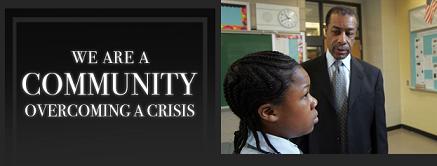
This past July there was a panel called "Raising Him Alone," part of the larger conference "Saving Our Sons."
It's in the Bronx, feel free to guess at the audience. This will include a
There's two ways to make this work. One way is to find women who have raised successful black men, e.g. doctors, teachers, etc, to offer advice about how to keep your son focused on boring academics. But no, it features the mothers of rappers.
Well, ok. The other way to go about it is to find mothers who, like the audience, had to raise their kids in the same adverse circumstances, e.g. it's hard to be a black single mom raising a son in the inner city. Drugs, guns-- all of the stuff Jay-Z used to talk about before he bought a restaurant. However, there's a bit of a problem with their panelists, see if you can guess what it is:
Do these women have anything in common with their audience? Dr. Hines is nominally a "single black mother"-- the words are accurate-- but she's also a woman with a Ph.D. who sent her kid to private school. Both of Kweli's parents are college professors. But since their sons are pretending to be inner city youth forced to choose between rapping or dealing, they are therefore mothers of inner city youth almost gone bad, even though they're not. But no sane person is going to question the 'hood cred of the mother of Common.
The tragedy of this conference is that Dr. Hines et al have a real and valuable contribution to make: how they managed, as black single mothers, to continue their own education and professions-- but that's a conference no one would attend. But shoudn't the conference organizers have pushed for it anyway, for them to be role models in that way? Instead of letting the women be who they are, they turned them into symbols of something that they aren't to no benefit of the community at all.
And if this is a conference about educating black kids, then isn't Ph.D. mother raising a rapper son the exact opposite of what you want? Oh, is that wrong to say? Imagine Eminem's mom coming to speak to white parents about the importance of educating children.
The unfortunate message of this program is the importance of raising sons to be famous (i.e. how they reflect on you) is more important than the example you set for your kids (how you reflect on them.)
VI.
"What's with white kids today? Why are they pretending to be black?"
They're not, they're pretending to be masculine. You may not believe this, but white boys/men have no symbol of masculinity or toughness-- or of sexual power-- that they can brand themselves with. The fictional white tough guys are either "black" or are flawed: strong in one way but weak in some other (broken men, depressed, drinkers, etc.) They have to pull it together to be tough. And white tough guy/heroes cry a lot. What's up with that?
If a white kid wants to project masculine energy, he better figure out a way to be black and make it look legitimate. Fortunately, Eminem and others have done the hard work of branding blackness, reducing it from something you are to something you adopt, turning it into apparel to wear when you need to convey information. Now it's credible that white guys can be black without actually having to be black. Thanks.
The odd problem that this presents is that though black kids in the inner city may legitimately need to project toughness, the white kids'-- and many black kids'-- accumulation of toughness brands is actually useless. However, if you brand yourself long enough you begin to believe it. At the expense of applying to graduate school and possibly your life.
They're going to find themselves one day, full of anger and resentment and rage at absolutely nothing at all-- and middle aged.
How are the 40 year olds who got caught up in the east coast/west coast battles faring today? Was it worth it? It was for rappers, I guess.
VII.
Back to Jay-Z. He's probably in no danger of being deported to Sicily. But he's definitely "drawn a line in the sand" (his words) about Autotune and rap in general.
Well, maybe. Or maybe he realized, after making an album's worth of songs that did use autotune, that it was becoming overused and hack, and so he dumped those songs, made an anti-autone song, and prepared to pretend to be the one who caused the demise that was coming anyway.
Or maybe he's creating a fake controversy that he himself doesn't believe in, but that his audience can use to communicate to other people who they want to be: "I'm against autotune, I'm street and authentic;" "I'm for autotune, I'm artistic and fun." Fake divisions that can be used as brands.
In that way, both he and the Autotune guys can benefit.
Here's a picture of Jay-Z performing Death of Autotune this summer:
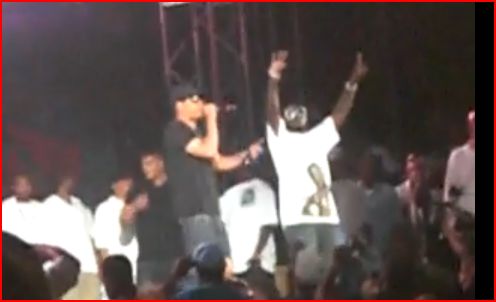
See that guy next to him? That's T-Pain.
And he looks authentically pissed.
----
Clarification on masculinity here.
And then the VMAs.
----
http://twitter.com/thelastpsych
No lyin, your niggas' jeans too tight
Your colors too bright, your voice too light...
You niggas singin too much,
Get back to rap you T-Pain'n too much
I'm a multi-millionaire
So how is it I'm still the hardest nigga here?
I don't be in the project hallway
Talkin' bout how i be in the project all day
That sounds stupid to me,
If you a gangsta, this is how you prove it to me
Yeah, just get violent
This is death of autotune, moment of silence
Ok, calling someone less authentic than you is a standard combat maneuver. Nothing new there.
So if Jay-Z wants to depict his authenticity, to show how and raw, honest, legitimate he is in comparison to the other "niggas" he would do this by placing himself in authentic, legitimate, true to his roots situations and settings.
Here's where it got interesting.
Based on the video, Jay-Z is, deep down, a guy who dines alone in Italian restaurants.

who pays his respects to the chef-- or the other way around--

etc, for more pics see any episode of The Sopranos.
My first reaction was that maybe Jay-Z had had a stroke. Is he aware that he is not actually Italian?
After this meal, he goes to the back of the restaurant with other legitimate Italians like Harvey Keitel and, believe it or not:

Yes this is an all night poker game, yes it is played in the stockroom of the restaurant, yes they are sharing a bottle of wine and some pasta, yes that's an olive oil sign, yes those are hundred dollar bills ("this ain't a strip club"), yes they are all in suits, and no he's not kidding.
In a video about getting back to basics and authenticity, he chooses an entire persona that couldn't be less authentic. What's crazy about this is that music today tries to be more urban, more street, more black-- things that he authentically is already, he's technically won his argument just by waking up in the morning-- and yet he instead picks a character that is utterly unrealistic, waves it in our face and and says, "this is me, keeping it real."
II.
It would be easy to just say he's an idiot, but this is a man who is hypersuccessful precisely because he can manipulate imagery to connect to his audience. He may be Italian, but he's no dummy.
The problem Jay-Z faces is that because all anyone knows about him is images, he has no way of signaling authenticity. If he's shows himself in the projects or on a yacht or behind bars or on the moon, no one can know if it's really him or if it's hype. Maybe he owns a spaceship, who knows?
So Jay-Z chooses to signal his authenticity not with authenticity, but with an already established symbol of authenticity: because otherwise, how would we know he was being authentic? Italian= authentic, traditional; black = masculine, strong. He already has the black part. And it doesn't matter if the other actors are real Italians either, as long as they symbolize "Italian" which symbolizes "authentic". Hence Harvey Keitel.
There's another major benefit from choosing a completely unrealistic symbol of authenticity. Note that his audience isn't Italian mobsters or "kids in the hustle;" there aren't enough of them. His audience is regular people, black and white, for whom authentic isn't "being yourself" or "true to where you came from" because for those regular people, that would be unbearably boring. For them, authentic has to mean loyalty to the persona you made up. This video isn't about Jay-Z's authenticity, it's about letting you choose your own authenticity.
He does this not by being Italian-- obviously no one believes he plays back room poker at Rao's; but by reducing "Italian" to a symbol or commodity that can be acquired or put on, like an outfit, in order to convey information to others. In other words, he's using Italian as a brand. He is more authentic branded as a TV Italian than if he was actually just himself. Read that last sentence again.
That's how you build the Matrix.
III.
This ain't for Z100... this is for Hot 97...That may be true; and that may convey the impression that his music/this song is elite, not for everyone, it has some reserved status and/or artistic integrity, but it is not in reality any more difficult to get it from the free radio station Hot 97 than from the other free station Z100. In other words, it's not really elite, it's just branded as elite.
This is anti-autotune, death of the ringtoneOf course it is: here's a ring tone, here it is on itunes, here's an MP3 on Amazon, and I fully expect to see lots of guys performing it terribly through open car windows... but that's the draw. That's the business smarts of Jay-Z. Brand it, make it seem elite, make it an aspirational product-- but make it easily available, everywhere. I'm surprised he hasn't thought of selling scratchy, barely audible free underground bootleg copies of the song for $24.99.
This ain't for itunes, this ain't for sing-along
That's Trading Up again (and I should tell you that book doesn't describe it as a social critique but in all earnestness). That's the two parts of profiting from effective branding. You have to make it seem elite and hidden, but make it easy/affordable to access it. Then-- and this is the key-- the consumer has to be able to show others that they've accessed it: that's the only way other people are going to know who they are pretending to be.
IV.
This is how kids operate, but it is also how adults-- who don't realize they are adults but still think they're kids-- act as well. I hardly need to tell you what this phenomenon is called.
Here's a random coincidence for you: there's a book called From Jay-Z To Jesus, and it has this sentence on the back:
Acknowledging that young adulthood now encompasses ages 18-39...I'm shaking my head because they're right.
V.
Guess what this picture is all about:

This past July there was a panel called "Raising Him Alone," part of the larger conference "Saving Our Sons."
Don't miss Saving Our Sons! This free community event is open to everyone who is concerned about the educational crisis facing young men of color and wants to make a difference! Learn strategies for helping our young men achieve academic, professional, and social success. This event is for EVERYONE - parents, grandparents, educators, mentors and concerned citizens because real change can only happen when an entire community is informed and engaged.
It's in the Bronx, feel free to guess at the audience. This will include a
a panel discussion featuring prominent women who have successfully raised their sons alone.
There's two ways to make this work. One way is to find women who have raised successful black men, e.g. doctors, teachers, etc, to offer advice about how to keep your son focused on boring academics. But no, it features the mothers of rappers.
Well, ok. The other way to go about it is to find mothers who, like the audience, had to raise their kids in the same adverse circumstances, e.g. it's hard to be a black single mom raising a son in the inner city. Drugs, guns-- all of the stuff Jay-Z used to talk about before he bought a restaurant. However, there's a bit of a problem with their panelists, see if you can guess what it is:
Dr. Mahalia A. Hines (mother of rapper and actor Common), Dr. Brenda Greene (mother of rapper and activist Talib Kweli) and Sheron Smith (mother of Grammy nominated actor and rapper Mos Def.)
Do these women have anything in common with their audience? Dr. Hines is nominally a "single black mother"-- the words are accurate-- but she's also a woman with a Ph.D. who sent her kid to private school. Both of Kweli's parents are college professors. But since their sons are pretending to be inner city youth forced to choose between rapping or dealing, they are therefore mothers of inner city youth almost gone bad, even though they're not. But no sane person is going to question the 'hood cred of the mother of Common.
The tragedy of this conference is that Dr. Hines et al have a real and valuable contribution to make: how they managed, as black single mothers, to continue their own education and professions-- but that's a conference no one would attend. But shoudn't the conference organizers have pushed for it anyway, for them to be role models in that way? Instead of letting the women be who they are, they turned them into symbols of something that they aren't to no benefit of the community at all.
And if this is a conference about educating black kids, then isn't Ph.D. mother raising a rapper son the exact opposite of what you want? Oh, is that wrong to say? Imagine Eminem's mom coming to speak to white parents about the importance of educating children.
The unfortunate message of this program is the importance of raising sons to be famous (i.e. how they reflect on you) is more important than the example you set for your kids (how you reflect on them.)
VI.
"What's with white kids today? Why are they pretending to be black?"
They're not, they're pretending to be masculine. You may not believe this, but white boys/men have no symbol of masculinity or toughness-- or of sexual power-- that they can brand themselves with. The fictional white tough guys are either "black" or are flawed: strong in one way but weak in some other (broken men, depressed, drinkers, etc.) They have to pull it together to be tough. And white tough guy/heroes cry a lot. What's up with that?
If a white kid wants to project masculine energy, he better figure out a way to be black and make it look legitimate. Fortunately, Eminem and others have done the hard work of branding blackness, reducing it from something you are to something you adopt, turning it into apparel to wear when you need to convey information. Now it's credible that white guys can be black without actually having to be black. Thanks.
The odd problem that this presents is that though black kids in the inner city may legitimately need to project toughness, the white kids'-- and many black kids'-- accumulation of toughness brands is actually useless. However, if you brand yourself long enough you begin to believe it. At the expense of applying to graduate school and possibly your life.
They're going to find themselves one day, full of anger and resentment and rage at absolutely nothing at all-- and middle aged.
How are the 40 year olds who got caught up in the east coast/west coast battles faring today? Was it worth it? It was for rappers, I guess.
VII.
Back to Jay-Z. He's probably in no danger of being deported to Sicily. But he's definitely "drawn a line in the sand" (his words) about Autotune and rap in general.
Well, maybe. Or maybe he realized, after making an album's worth of songs that did use autotune, that it was becoming overused and hack, and so he dumped those songs, made an anti-autone song, and prepared to pretend to be the one who caused the demise that was coming anyway.
Or maybe he's creating a fake controversy that he himself doesn't believe in, but that his audience can use to communicate to other people who they want to be: "I'm against autotune, I'm street and authentic;" "I'm for autotune, I'm artistic and fun." Fake divisions that can be used as brands.
In that way, both he and the Autotune guys can benefit.
Here's a picture of Jay-Z performing Death of Autotune this summer:

See that guy next to him? That's T-Pain.
And he looks authentically pissed.
----
Clarification on masculinity here.
And then the VMAs.
----
http://twitter.com/thelastpsych
51 Comments